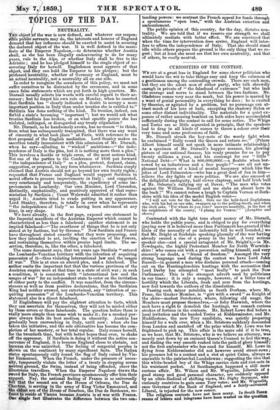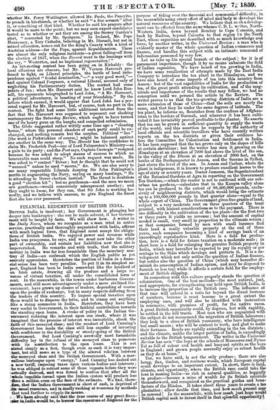CURIOSITIES OF THE CONTEST.
WIt are at a great loss in England for some clever politician who would have the wit to take things easy and keep the calmness of a gentleman among the contending crowds. There are such men, but they are the silent men of either party, who talk shrewdly i enough in private of " the falsehood of extremes" but who lack the courage and nerve to stand between the two factions. Mr. Gladstone comes very near the mark, but his power is marred by a want of genial personality in everything he does ; he is excited by theories, or agitated by a problem, but no personage can at- tract much of his love or hate, excepting the shadowy Helen or some other distant individuality. The materials for a quiet ex- posure of rather amusing bombast on both sides have accumulated. sufficiently during the contest to call for some notice. The Whigs and Tories are so little separated in principle, that the speakers had to drag in all kinds of names to throw a colour over their very tame and same professions of faith.
Mr. Disraeli struck the key-note of the wordy fight when he exclaimed " Rally round the Queen and return me." (Prince Albert himself could not speak in more intimate relationship.) As a specimen of Mr. Disraeli's happier manner, his glowing picture of our national finance, his ready promise for us to par twenty millions a year, and his contempt for our " little ' National Debt—" What is 800,000,0001.—a fleabite when bor- rowed by i an industrious and a free people ? "—are all not un- pleasant instances of a kind of mental buoyancy which like the jokes of Lord Palmerston—who has a great deal of fun in him- ;.elieve the dry fights of mere politics. We are also amused at the delightful ambiguity, half clever claptrap, and half Irish bull of Mr. Osborne's rallying cry at Dover, " The man who votes
against Sir William Russell and me :tabs an absent hero in the back I" We cannot refuse a laugh to Captain Vernon at Berk- shire with his idea of the model English voter-
" I wilt not vote for the ballot. Give me the bold-faced Englishman who, with his hat on one side, swaggers up to the polling-booth, and when the clerk asks, For whom do you vote ?' answers manfully, in the face of his neighbours of the county, ' I plump for Vernon." (Laughter and cheers.) Contrasted with the light tone about money of Mr. Disraeli, who holds the public purse, and is obliged to pay for everything (paying now it is believed more than Parliament has granted if the hints of the necessity of an indemnity bill be well founded,) we find Mr. Bright at Rochdale speaking gloomily of the war having already caused a rise of a penny in the loaf. A very serious speaker also—and a special antagonist of Mr. Bright's —is Mr.
ewdeg ate, the highly Protestant Member for North Warwick- shire ! who comes out with a peroration calling himself, and very sincerely no doubt, a "friend of freedom. Amongst the very strong language used during the contest we have Lord John Russell—in general a man who disdains personal attack—coming out on the Huntingdonshire hustings with the accusation that Lord Derby has attempted " most foully " to pack the New Parliament. This is the strongest adverb used by politicians in our times ; it is only a sample, however, of a bitter tone of hostility which the Liberals, fresh and sore from the hustings, now feel towards the authors of the dissolution.
Passing such minor notabilia as South Durham, where Mr. Pease, the Quaker Member, is " girt with a sword " as Knight of the shire—modest Dorchester, where, following old usage, the Members must propose themselves,—or fishy Harwich, where the mob have a right to demolish the hustings, we remark curious strokes of fortune in the contests. Mr, Robert Lowe fled before a local irritation and the banded Tories at Kidderminster, and Mr. Huddlestone, the new Tory candidate, was quietly preparing himself for a walk over, when a Mr. Bristowe suddenly descended from London and snatched off the prize which Mr. Lowe was too frightened to pick up. This affair is the more odd if it be true, as we hear, that Mr. Bristowe, who is we believe an attorney, was merely sent down by an eminent Queen's Counsel to feel the way, and finding the way smooth rushed into the path of glory himself ; not the first ambassador who has sued for himself. Mr. Lowe in flying from Kidderminster did not however avoid street-rows ; his presence led to a contest and a riot at quiet Caine, always so amenable to the patriarchal Landsdowne ; suggesting the idea that this white-headed boy of the Whigs carries note and riot-acts in his waistcoat pocket. At Southampton happened a still more curious affair. Mr. Wilcox and Mr. Weguelin, Liberals of a good stamp and good personal character, are suddenly opposed by an ultra-Radical of shifting views, Mr. Digby Seymour, who curiously contrives to gain some Tory votes; and Mr. W once Governor of the Bank of England, and a fairly-ad Liberal, is rejected for the new comer. The religious contests have not been many. In Essex reams of letters and telegrams have been wasted Oli n tua ith
whether Mr. Percy Watlington allowed Mr. Poole, the Puseyite, -to preach in his church, or whether he said "a line sermon" after it, or something of that kind. Whether he said his prayers after it would be more to the point; but we may soon expect candidates tested as to whether or not they are among the Surrey Garden's elect, " converted by Mr. Spurgeon." In Ireland, Mr. Pope Hennessey, a Tory Catholic, believing in Mr. Disraeli, but not in mixed education, comes out for the King's County with a kind of Austrian address—for the Pope, against Republicanism. These are almost the only religious incidents—a great falling-off from the election of 1857, when the Record went to the hustings with the cry, " Westerton, and no baptismal regeneration ! " An interesting contest has been going on in Kirkaldy : the local allusions are obscure, but Mr. W. Vernon Harcourt pro- fessed to fight, on Liberal principles, the battle of local inde- pendence against " feudal domination,"—" a very good word,"— and against Colonel Ferguson, a rational Liberal, accused only of neglecting his Parliamentary duties. The contest had some points of fun ; when Mr. Harcourt said he knew Lord John Rus- sell, his opponents telegraphed to Lord John, " A Mr. Harcourt, a political adventurer, is boasting of your friendship." By the letters which ensued, it would appear that Lord John has a per- sonal regard for Mr. Harcourt, but, of course, took no part in the contest. The fight had some little additional interest from the fact that Mr. Harcourt was supposed to represent our slashing contemporary the Saturday Review, which ought to have turned one of its heavy guns on the burghs and compelled submission.
The Globe suggested rather wittily some time ago a "clearing lionse," where the personal slanders of each party could be ex- changed, and nothing remain but the surplus. Political " lies " (the word is Pickwickian of course,) might be balanced against one another in the same way. The Herald has the confidence to claim Mr. Frederick Peel—one of Lord Palmerston's Ministry—as a gain to its party ; and the Post says, Captain Carnegie " resigned because he was asked to adopt means of success to which no honourable man could stoop." No such request was made. He was asked to " contest " Dover ; but he thought that he could not " succeed" unless he used " means," &o. We are also sorry to see many respectable Liberals denying Sir John Pakiagton's merits in augmenting the Navy, saying on many hustings, " He is attending to Dover election instead." The thrust is doubtless a good " election hit " ; but no gentleman—and the men we mean are gentlemen—would consciously misrepresent another ; and they ought to know, for they can, that Sir John is working ho- nestly, and we believe with success, to give England the finest fleet she has ever possessed.



























 Previous page
Previous page